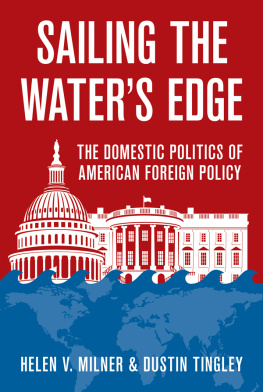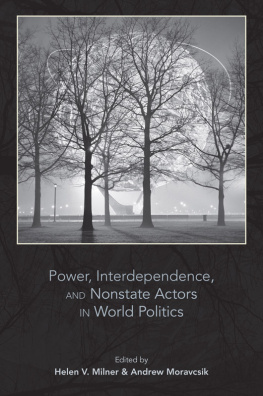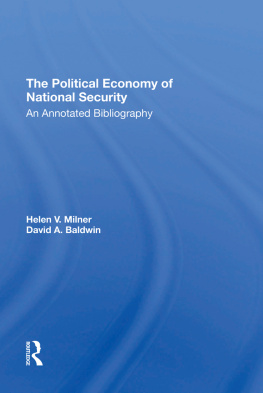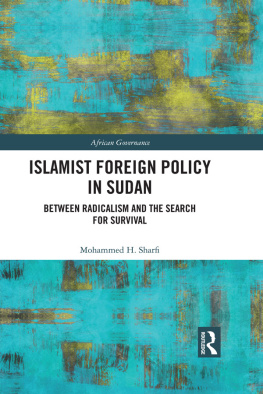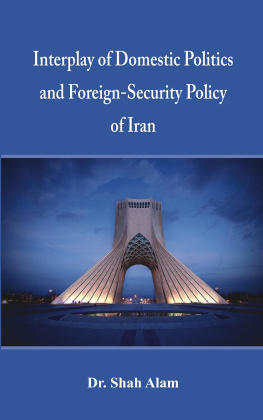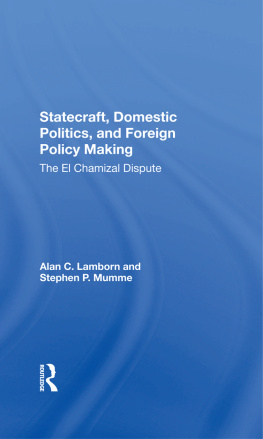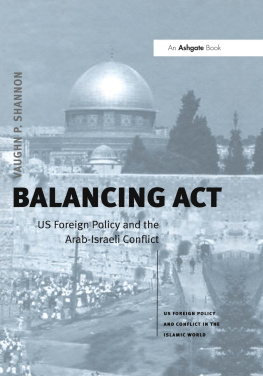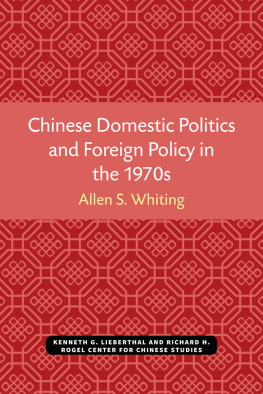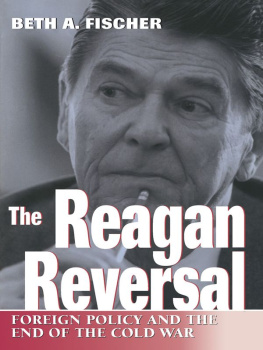COPYRIGHT 2015 BY PRINCETON UNIVERSITY PRESS
Requests for permission to reproduce material from this work should be sent to Permissions, Princeton University Press
PUBLISHED BY PRINCETON UNIVERSITY PRESS
41 William Street, Princeton, New Jersey 08540
IN THE UNITED KINGDOM: PRINCETON UNIVERSITY PRESS
6 Oxford Street, Woodstock, Oxfordshire OX20 1TW
press.princeton.edu
All Rights Reserved
Library of Congress Cataloging-in-Publication Data
Milner, Helen V., 1958
Sailing the waters edge : the domestic politics of American foreign policy / Helen V. Milner and Dustin Tingley.
pages cm
Includes bibliographical references and index.
ISBN 978-0-691-16547-9 (hardback)
1. United StatesForeign relationsDecision making. 2. United StatesMilitary policyDecision making. 3. Executive powerUnited States. 4. United StatesForeign relations1945-1989. 5. PresidentsUnited StatesDecision making. 6. United StatesForeign relations1989 I. Tingley, Dustin, 1979 II. Title.
JZ1480.M555 2015
327.73dc23
2015017560
British Library Cataloging-in-Publication Data is available
This book has been composed in Sabon Next LT Pro with Berthold Akzidenz-Grotesk for display
Printed on acid-free paper.
Printed in the United States of America
10 9 8 7 6 5 4 3 2 1
PREFACE
Writing this book has been a wonderful intellectual journey. It began when Dustin arrived at Princeton University as a graduate student in the fall of 2005. Originally, our focus was on each policy instrument in foreign policy by itself, and only later in comparison to one another as we uncovered the deep similarities and differences among them. We began working together on a series of papers on foreign aid. At that time, foreign aid was not much studied in the political science literature and especially not in the field of international political economy. Over the next decade this was to change greatly; the political science literature on foreign aid is now quite extensive. We began working on congressional voting on aid, following in the footsteps of some seminal research by Lawrence Broz, Christopher Kilby, and Benjamin Fordham on congressional voting on foreign policy. This collaboration led to a series of papers on a range of topics that we eventually published.
Following our work on foreign aid we decided that a comparison with the area of international trade policy would be instructive. This arose from a suggestion by an APSA discussant, Jeff Frieden, noting that we had an interesting cross-tabulation between aid voting and trade voting in Congress in our early work but that we had said nothing about it. This led us to further expand our US congressional districtlevel data containing a wide variety of economic and political variables. We had expected that scholars in American politics who work on Congress would have collected all of this already, but we found that that was not the case for many of the variables we needed, or that our reviewers told us we needed. Over time we realized we had a wonderful resource in the form of a district-level dataset on Congress during the period from the 1970s to the present. And this allowed us to compare the politics of international trade and aid policy. Our efforts here led to the publication of our article in International Organization, bringing together the political economy of trade and aid with the foreign policy dimension as represented by the role of the president in the United States.
Our next step was to ask about immigration policy. We viewed immigration as another form of economic foreign policy. The admission of foreigners into the United States and the conditions for their livelihoods there were not just a function of domestic politics; they affected relations between the United States and other countries as well. And they certainly could be used to improve or degrade those relations. We again found our dataset on congressional districts useful. But the politics of immigration was very complicated. The issues and groups involved seemed much more numerous and heterogeneous than did the ones in aid and trade. But again the role of economic interest groups and ideological factors stood out as they had in aid and trade policy.
This led us to wonder whether other areas of US foreign policy looked similar or distinct. We then embarked on a journey to add military components of foreign policy to our set of comparisons. We gathered information on geopolitical aid as distinguished from the kind of development-oriented aid we had originally examined. And then we added military interventions by the United States that had been acknowledged by Congress. And finally we brought in domestic military spending. These three military-oriented areas of foreign policy turned out to be different from one another in interesting ways and fit nicely into our developing ideas about how to understand the ensemble of US foreign policy.
Our last foreign policy instrument was sanctions. This of course should not have been last, but turned out to be the most difficult. Sanctions do not follow some easy legislative or executive pattern; rather, they mix the two branches and combine different policy goals. But adding sanctions to the mix was highly useful since they bridge the economic and military instruments we had previously compared.
Our original research had covered congressional voting and the presidents role in it. We then realized that there is much more to foreign policy making than this aspect, although it is key. Without congressional assent, the president cannot carry on much foreign policy for very long. Most every instrument requires funding or legal sanction if carried out over any period of time. In addition, we had long been interested in American public opinion on foreign policy. Again this is an important long-term constraint on the president, but it is not the only key to everyday decision making. Hence we decided to expand our overview into congressional and presidential budgeting, which also highlighted the variance in presidential power across foreign policy instruments. This research was made much easier by building upon the shoulders of those going before us in the two presidencies literature, namely, work by Brandice Canes-Wrone, David Lewis, and William Howell. Bureaucratic politics has been known as a fundamental element of foreign policy making for a long time; we also considered it to be critically important. And this led us to delve into the literature on congressional and presidential control over the bureaucracy in foreign policy. An important contrast between presidential and congressional control over different foreign policy instruments arises when one looks at who controls the bureaucracy.
Another critical input into foreign policy making is interest groups and their activity. This has been well documented time and again, but we hoped to add more systematic research. The development of new empirical methods using text analysis has been a boon here. Collaborative work between Dustin, Molly Roberts, and Brandon Stewart in part produced the Structural Topic Model that allowed us to understand what topics are most likely to be taken to the White House and which bypassed the White House. We were also able to look at variance across foreign policy instruments and the role of interest groups using congressional testimony. Again, contrasts across the foreign policy instruments revealed how these groups exercised influence through lobbying and information provision, underlining how interest group battles over policy could undermine presidential control of policy.

